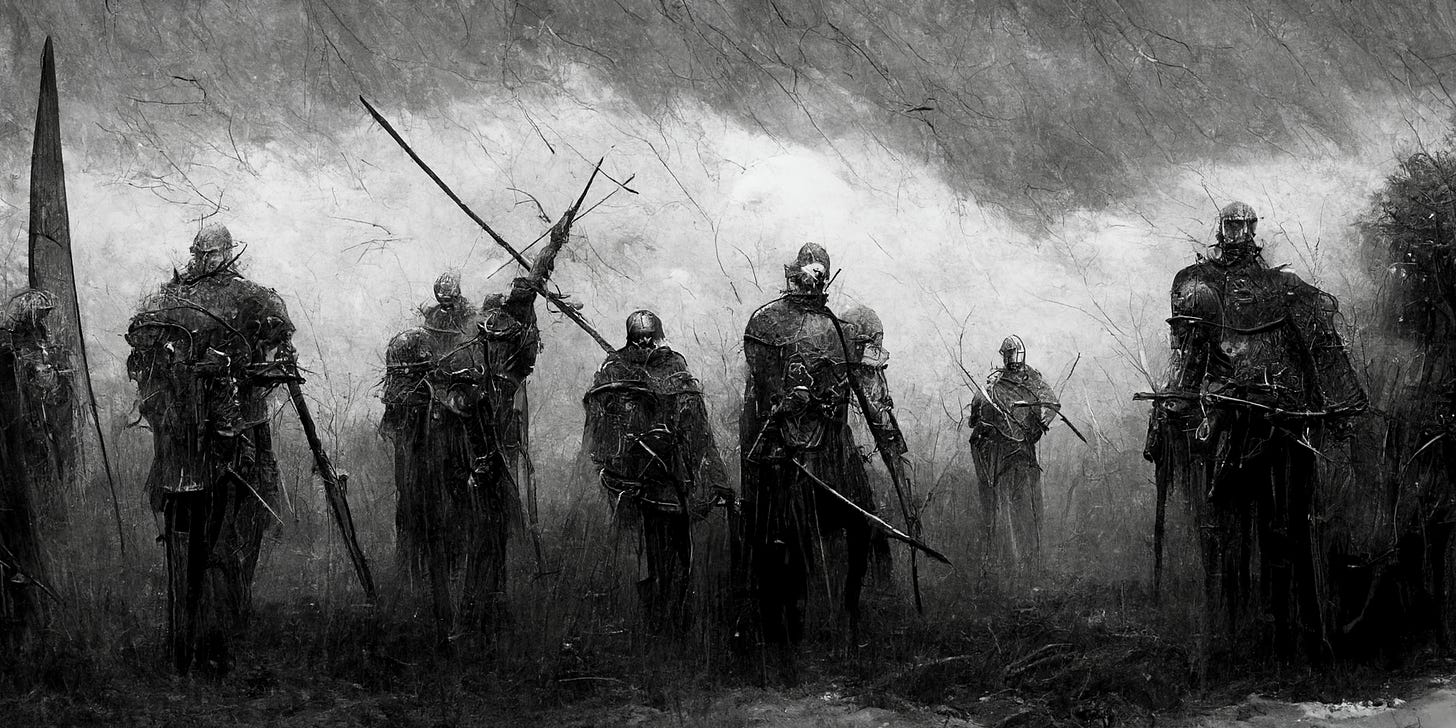Taking Action
Intent, Leverage, Cost, Stakes, Roll, Impact.
This Week’s post looks at the Action procedure in Mythic Bastionland.
It was a while ago that I wrote this. Since then I'm working with a slightly different procedure. Let's look at the Oddpocrypha entry for it.
TAKING ACTION
PLAY
Ref: With its walls torn down, the village is now a bit of a sitting duck if the Legion decide to attack again.
Tal: We could stay and guard them but the Seer told us the Legion always comes back in greater numbers, right?
Moss: Yeah, how about we help them build some better defences?
Ref: Right, right. That would be a Task, so it would take a phase of the day, taking you up to Night. Let me just…
Ref flips to the Taking Action Procedure to remind themselves of the steps.
Ref: Okay, Intent. So what are you actually trying to do? Get the walls back to how they were? Make them even better?
Moss: Could we make them better?
Ref: Well let’s work through the rest of the steps before we commit to that. What’s your Leverage for this? How are you actually going to make it happen?
Tal: The serfs here would be on board with helping with the work, right? Plenty of wood around too.
Ref: Yeah. I mean with the limited skill, materials, and time you have I think the Intent is really going to be limited to getting it patched up as a solid but makeshift wall.
Moss: Fair.
Ref: Cost… I mean it’s taking up time and the work of the local serfs but they’re already inclined to help out. Stakes… now I don’t think the Legion are coming imminently, so there’s no risk of them showing up before the work is done. That means there’s no need to roll if you’re happy to spend the time on this.
Tal: Yeah, let’s do it.
Ref: So you gather the serfs and spend the afternoon chopping wood and cobbling together a ramshackle wall. Doesn’t look like much but at least it’s a line of defence against the Legion. The sun sets as you admire your work.
Moss: Well it’s something but we need a proper plan to beat them for good.
THOUGHTS
Here we see Ref work through the 6 steps of the Taking Action Procedure:
Intent, Leverage, Cost, Stakes, Roll, Impact.
It would be lovely if those six words formed a mnemonic, but it wasn’t meant to be.
Even though this ends up being resolved as a Task, shorter Actions follow the same procedure and make the same considerations, except for the fact that Tasks are assumed to consume significant time.
Talking through the specific stages by name is a good way to help internalise the process, but not strictly necessary once the group is comfortable with the process.
Also notable is that Ref feels comfortable leaving the Intent somewhat loose until the group have discussed Leverage. Working through the steps in order doesn’t mean you have to lock everything in as you go.
I’m glad Ref doesn’t get bogged down in the detail of how long it takes to build a wall, how many workers you need, how much material. No Referee can know all these things, and slowing down the game to brush up on the logistics of wall construction is unlikely to improve the game. Here we’re interested in the fact that the players want to invest time in performing this action, and the impact it has on the ongoing fiction.
There’s more transparency from Ref than you might expect, outright telling the players that the Legion aren’t coming back today. You want the world to have mystery, but it’s also important to give players the information they need to make their decision. If it was uncertain, Ref might have said “there’s a slim chance the Legion will come back today” or “there’s a high chance the Legion will come back today”, keeping a mental note of the odds they would use on the Luck roll to determine this later.
Giving them certainty here lets them get on with making the decision instead of agonising about something that the Referee knows won’t happen.
Elsewhere
Traverse Fantasy looks at different methods of procedural generation.
Roll to Doubt looks at how to pitch an OSR-style campaign to new players.
Goblin Punch presents a take on random encounters, tying them to a countdown clock.
Coming Soon
On Patreon I’m looking at how Trade works in Mythic Bastionland.
Mythic Bastionland doesn't really use money, or at least it isn't really a game about earning wealth and spending it on better gear.
Only the rich deal in coins. Most trade relies on more practical matters:
• Finding somebody who can supply
• Securing raw materials if needed
• Giving something in return, or owing
The value of any given item depends on the bargaining positions of the person holding it, and the person desiring it. Long-standing trade agreements often form into pledges of ongoing service or protection.
Let's look at how the Oddpocrypha section handles this.
Expect the full post on the blog next week.
Thanks for reading Bastionland Presser! Subscribe for free to receive new posts straight into your inbox.



IMPISS (pronounced "I'm piss")
Intent
Means
Price
Inherent risk
Shakers (ie dice shakers)
See what happens!
Here is what GPT-4 came up with after a very quick prompt:
It may help you find a better one. 😂
1. Initiating large changes, Sandra readily inspired progress.
2. In life, courageously strive, relentlessly impacting outcomes.
3. Isabel launched campaigns, swiftly realizing impactful victories.
4. Igniting lasting change, Steve raced into transformations.